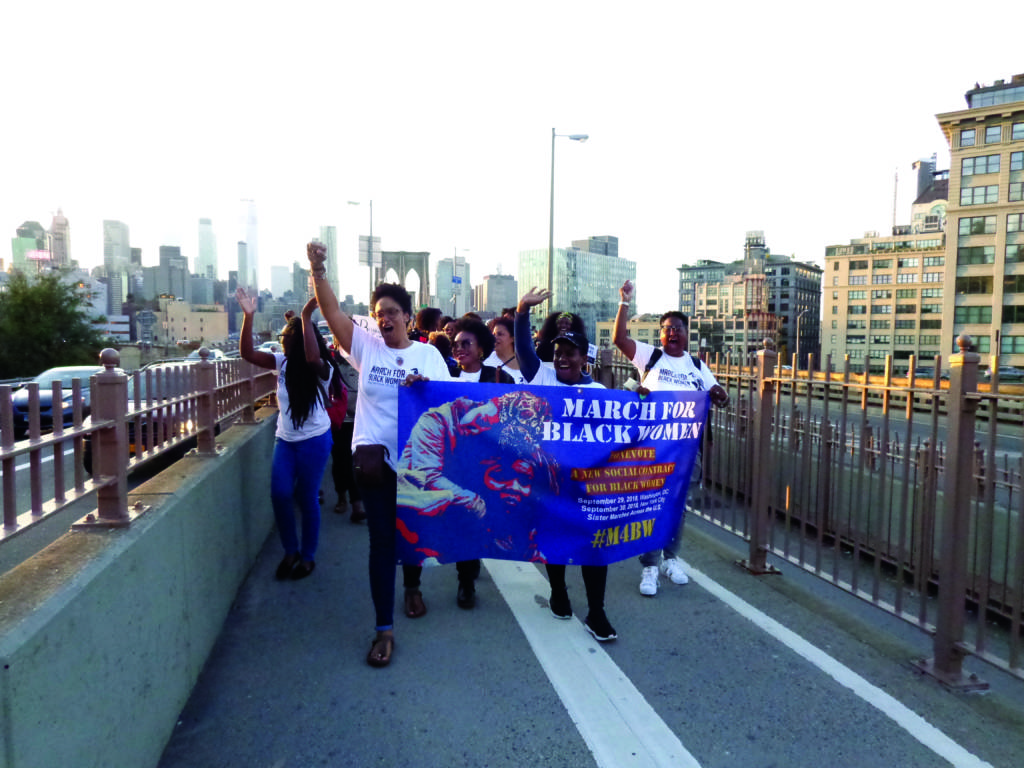I traveled to New York City in order to march across the Brooklyn Bridge on Sunday, Sept. 30, with the March for Black Women. The only chant I heard as we marched was “Why don’t you love Black women? R Kelly got to GO!”
It was a two-day event, gathering people for a rally on the National Mall on Saturday here in D.C. My journey for the project really started with an orientation at a church in the middle of the week.
I came in from Baltimore. But by the time I got to Metro Center, I couldn’t easily catch a bus that would go to the church hosting the orientation. So I made a few phone calls and decided to head back to Baltimore. As I jaunted down the Metro escalator, I saw my old friend and fellow Street Sense Media artist, Debora B. “Oh gosh! Debra this trip was not a loss! I see you!” I said.
She was unpacking her dinner at the top of the escalator. Greeting me with glee, she said “Write for my paper!” (This paper.) I promised Deb I’d write more and, as you can see, I kept that promise.
As I traveled back to Baltimore, I thought about when I first met Debora: the sandwiches we had shared and the Street Sense paper we had flipped through. Some of her words were printed on one of the pages and we discussed them with merriment.
“My friends like my writings,” Deborah had said.
“So do I!” I remember telling her. “Kinda of crazy and gibberish — tickles me.”
It was a joyful meeting, a warm memory.
Less so was the memory of what she asked of me during that meeting. “I need a friend to help me get housing,” she had said. Reflecting now, I noted mentally how many years back those words were uttered.
How is it our society has let her remain homeless for that long?
I made it to Baltimore without incident and had all the more resolve to shoot the march on Sunday. This march was for me. It was for my friend Debbie B. It was for all of us.
In a statement, the march organizers said this of its purpose: “We want meaningful policies to end gender violence, the persistent feminization of poverty, the growing Black female prison population, restrictions to citizenship the deportation of Black and Brown people, restrictions to health care, reproductive justice and the ongoing war on women through gag orders and blocked funding by those hoping to retain or gain political leadership this November and beyond.”
When I arrived in NYC, I sauntered over to City Hall and began hunting for the ladies. I met two along the way and had a deep conversation with one about relationship failures. Like the statement mentioned, one of the big themes for our demonstration was that violence in relationships can be circumvented. We must strive to empower women and learn to have healthy relationships based on consent. If fear is evoked in a relationship, that indicates you are in an environment of violence.
Once I spotted Jonathan, who I had met during another march, I knew we had found the rest of the participants. We shared hugs.
I did not feel well and took a few shots from where I stood that would turn out crazy just like I like. We soon headed across the bridge, which I took care to cross safely since I am visually impaired.
I remembered the first time I crossed the Brooklyn Bridge, when a lady screamed “If you didn’t have on that yellow coat you would have been squished!” But on the Sunday of the March for Black Women, all I heard was “Why don’t you love Black women? R Kelly got to GO!”
At our gathering afterward, I met the Black woman who climbed the base of the Statue of Liberty on Independence Day with a “Trump Care Makes Us Sick” shirt.
It was a fun shoot! Public response was pleasant and the policemen waited for us at the end of the bridge walk.








